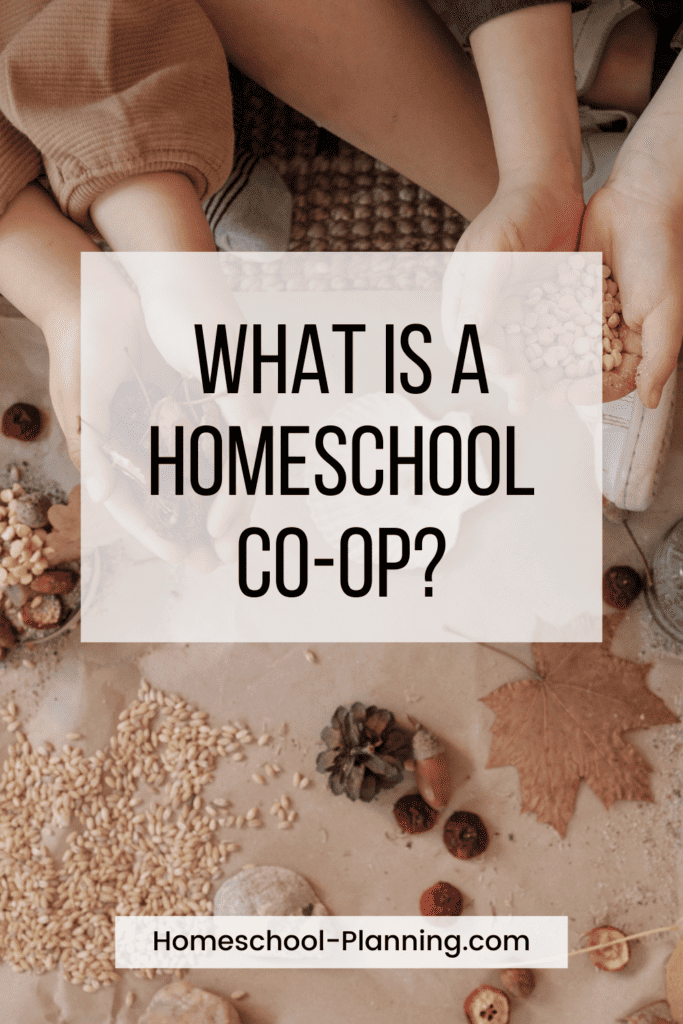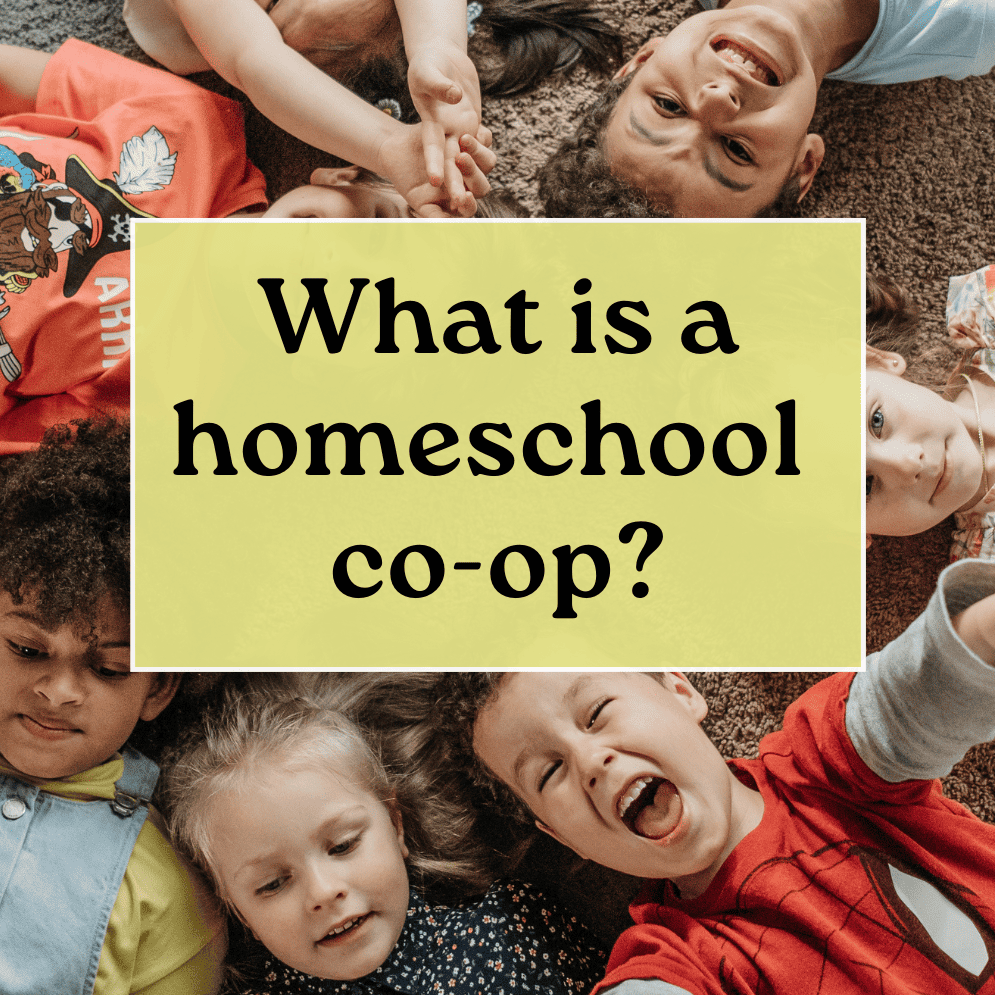In the homeschooling world, it won’t take long before you come across someone talking about being a part of a homeschool co-op. It may be good opinions or bad, and you will find varying thoughts and experiences among homeschool families about their co-op groups.
In this article we will discuss the ins and outs of homeschool co-ops. What a co-op is, and what it isn’t. Pros, cons, and even how to find a homeschooling co-op for your family.
So let’s get to it!

What does co-op mean in homeschool?
The word co-op in homeschool and elsewhere is short for cooperative. So a homeschool co-op in basic terms is a group of families who work together, or cooperatively, to homeschool their kids. Most co-ops meet weekly or biweekly, spending a few hours together learning as a group. The key is that all parents are involved.
Each homeschool co-op is about as unique as the individuals who are involved in it. Some co-ops will focus on academic classes, while others do enrichment classes together. Co-ops can be centered around most anything the group decides, like social events, the arts, or sports.
How do homeschool co-ops work?
Homeschool co-ops are run by the families involved in them. In traditional co-ops, both the teachers and administration are the parents, who take turns teaching classes and events. Because all the parents volunteer to lead, costs can be lower than other types of groups, making this an affordable option for most homeschool families.
Co-op groups tend to have at least 3 families involved but often include more than 100 families. They typically will be limited by the space they meet in and the willingness of those involved to help manage a large group. Co-ops often meet in church buildings, community centers, or libraries.
Many homeschooling co-ops meet once a week during the school year, often about 10-15 classes per semester. Some co-ops may instead choose to meet every other week or only once a month. While some groups meet once a week for several hours, and others will meet 2 or even 3 times a week for less amounts of time. Some will cover all ages and several subjects each semester, and some will focus only on one age range and/or one class topic per semester.
Ultimately, there is no hard and fast rule for how often a co-op meets or the subjects they cover together.
Homeschool co-ops are a great opportunity for friends and social gatherings for homeschoolers. Many families also love co-ops so give their kids the ability to be a part of classroom learning and experience a teacher other than their parents. Co-ops are also great for helping your kids learn about subjects you may find difficult to teach at home or those that are hard to teach with a smaller group.

Pros to being part of a homeschool co-op
Homeschool co-ops are great opportunities for families to be able to have social time with others and learn from them! My kids have learned a variety of things I couldn’t teach them myself well, like sewing and gardening, while I also get to teach some subjects I enjoy like calligraphy! There is never enough time for what I want to do with my kids after basic academics, but co-op has helped us get to more fun topics.
- Opportunity to make friends
- Mom gets to be with other adults
- Learning from someone other than parents
- Experience a classroom environment
- Exposure to other cultures, people, and beliefs
- Learn a topic mom struggles to teach
- Teach a subject you are passionate about
- Be a part of a larger group
- Opportunity for social events
- Learn topics better suited for groups, like band and theatre
- Variety in activites and learning
- Learn from someone passionate about the topic
- Field-trip opportunities
- Great for doing messy subjects like art or science
- Share the burden of homeschooling
- Learn from other families
- Experience other styles of learning/teaching
- Community with similar goals
Cons to joining a homeschool co op
Many families struggle with finding the right co-op that fits their family. You may have different beliefs, goals, or you may want something else from a co-op than they can give. Homeschool co-ops take a lot of time and work from parents as they must help to make it successful. If you try one co-op and it’s not a good fit, don’t be afraid to try again, maybe you will find your tribe!
- Takes time away from your other work and homeschooling lessons
- Teaching a class takes time to prepare
- Navigating relationships with others can be difficult
- May be exposed to things you don’t agree with
- Less control over learning environment
- You may not always be able to be with your children
- Not all families will share the same beliefs on religion, education, or discipline
- Can be very demanding on your time
- Can be difficult to find a group that works for you
- Parents must stay and volunteer
- Not a drop-off group
- May be too structured for some families
- Still has some associated costs to cover the meeting place and supplies.
Who’s in charge of a homeschool co-op?
Homeschool co-ops are technically run by all the families, but most have a smaller group of parents on the board that takes on more of an administrative role. This is especially true for larger groups.
The administrator or administrative board will handle the logistics of where the co-op meets, setting the schedule, organizing helpers and subs for the classes, managing the calendar of events, and dealing with insurance, supplies, and other fees. The board also helps with any complaints or disciplinary issues.

What is the meaning of co-op schooling?
Co-op schooling for homeschoolers is cooperatively sharing the load of homeschooling. Often this is accomplished by getting together with other families regularly for some group learning. Many homeschoolers will call these homeschool co-ops.
Each US state’s laws vary on what homeschoolers can do. Some states require parents to be involved in all the homeschool learning, while others will allow tutors. Homeschool co-ops can usually satisfy the laws of both types of states since parents volunteer within the co-op. Of course, each group should be sure to follow the laws of their state, even as far as insurance and licenses that are required. More info here.
What parents should consider
Every homeschool co-op is different, so finding one that fits your needs can be difficult. Some things to think about is whether the group fits your religious beliefs, goals for learning, and schedule. Be sure you understand the requirements for participating and that it meets your social needs. Also be sure to check on the group’s ability to meet any special needs your family may have.
Understand that a true co-op requires parent involvement. Some require every parent to teach, while others also have other roles parents can fill. Either way, to accomplish the cooperative aspect, all families usually help out. One good side to this is that because you aren’t usually paying for teachers, the cost is less!
Every family is different in what they need to homeschool their kids. Some families are great at accomplishing the basic academics but struggle with fun stuff. Other families may do well at doing fun activities and lessons with their kids but struggle more with things like science or math. Families should be able to fill these gaps with a homeschool co-op, but not every homeschool co-op will be able to fill these gaps.
Some co-ops are centered around basic academics, some are more about enrichment and supplemental learning. Some groups will be best just for social activities and events. Some will only have classes for certain ages. So it may take time to find the right co-op for your family and your unique needs. Of course, not every area will have multiple options to choose from, but don’t be afraid to try more than one!
If you cannot find a group that works for you in your area, consider starting one! Here’s an article with some ideas. But be sure to follow the homeschool group laws of your state!
How to find a homeschooling co-op
One of the best ways to find homeschooling resources in your area, including co-ops, is to ask other homeschoolers. You can easily do this whether you know any or not by joining a local homeschool group on Facebook. To find a group, just type in [your city/county/state name] + “homeschool” in the Facebook search bar. It will then give options to join.
Many homeschooling opportunities are spread by word of mouth, and this is a great place to get the info. These groups are also valuable to learn more about homeschooling in general! Whether you use it regularly or not, Facebook groups can be valuable resources for things like groups, so I suggest getting an account even if only for this purpose.
You also may try searching Google similarly. You could type [your city/county/state name] + “homeschool co-op” or even just “homeschool co-op near me” and then allow Google to see your location. Search results will come up for your area.
There are also a few websites that have lists of groups already collected on their site, just understand that these lists will likely not be comprehensive. A few of the best options I have found to search are on HSLDA’s site, The Homeschool Mom, and Homeschool-Life.

Are homeschool groups and homeschool co-ops the same thing?
“Homeschool groups” is a general term used for any kind of group for homeschoolers. It may include co-ops, social groups, field trip groups, tutorials, pods, or any variety of other types. Homeschool co-ops are a more specific type of group where parents work cooperatively to provide opportunities for their kids.
While many people may use the terms interchangeably, even for groups that are not truly co-ops, homeschool co-ops are a definite style of homeschool group.
What is the difference between a homeschool pod and a co-op?
Homeschool pods typically share the load of all the teaching throughout the week, meeting most days. Whereas co-ops usually meet only once a week while families will complete their individual learning at home throughout the rest of the week. Homeschool co-ops are often much larger groups, with 10+ families involved. A pod is usually limited to just a small handful of families.
A homeschool pod is a new-ish term that has come about in recent years. This is a small group, usually just a few families, that homeschool their kids together. These can be similar to a homeschool co-op but often will join to hire tutors for the kids rather than cooperatively teaching. Or they will each teach one day a week, splitting the responsibility of learning between the members. This type of group is helpful for parents reluctant to take on full responsibility of homeschooling, or those parents who also work.
Understanding your group and the differences is important, especially with your state law. Some US states handle drop-off situations like daycare or private school and have different requirements for families to abide by.
What is the difference between a coop and a tutorial?
A homeschool tutorial offers group classes for homeschoolers on various topics, from the arts to academics just like homeschool co-ops. The main difference is that in a tutorial, parents pay for teachers to teach (think tutor), similar to a private school. This is often a drop-off situation. In a homeschool co-op, parents are the teachers and are unpaid, thus making a co-op a significantly cheaper option, though it does require more time and energy from the parents.
Some tutorials meet 2 or 3 times per week and will cover all basic classes. Often this is called hybrid homeschool classes. While other tutorials will offer classes a la carte. Both co-op and tutorial options will often host group events, social activities, and field trips.

Co-ops for homeschoolers
A homeschool co-op is a great option for homeschoolers to take part in. Working with other families to supplement regular homeschool lessons and activities can take some of the burden off homeschooling parents. Whether you join a co-op that does main academic classes or is just for enrichment, a homeschooling co-op is great for socialization and can add variety to your homeschool. It is not always easy to find the right co-op that fits the needs of your family, but when you do, it can be amazing!
Are you a part of a homeschool co-op? I’d love to hear about your experiences in the comments!
Related Posts
Organizing daily homeschool work so your kids know what to do



